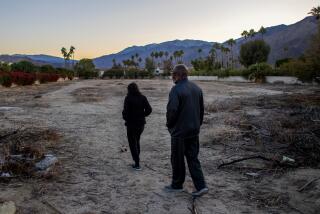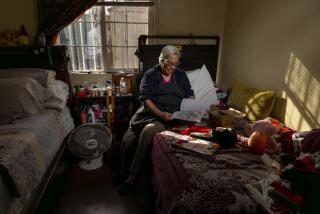Protest over New Orleans housing
- Share via
NEW ORLEANS — Protesters angry about the pending demolition of more than 4,000 public housing units stormed a City Council meeting Thursday in a confrontation that ended with a prominent civil rights lawyer being hauled off in handcuffs.
Thursday’s fracas was a taste of what’s likely to come as former residents of the aging, neglected buildings and their advocates seek to stop demolitions that could begin as soon as Dec. 15 in a city that faces an acute housing shortage.
The U.S. Department of Housing and Urban Development plans a wholesale redevelopment of the city’s public housing by tearing down the old barracks-style buildings and replacing them with mixed-income neighborhoods. A federal judge and Congress have refused to stop the demolitions.
About three dozen protesters gathered at City Council chambers to demand that the council’s members step in. But when the council took no action, the protesters broke into chants and shouts and forced Arnie Fielkow, the council president, to call the session into recess.
In the ensuing chaos, a sheriff’s deputy grabbed and shoved civil rights lawyer Bill Quigley against the wall, where he was handcuffed. Quigley has led a legal fight against the demolitions.
The deputy’s report said Quigley refused to leave the premises and shouted, “I’m not going anywhere.”
Quigley said he saw no reason for being detained and taken to a sheriff’s trailer on the grounds of City Hall. He was released shortly and cited with a charge of disturbing the peace.
“We live in a system where if you cheer or chant in the City Council you get arrested, but you can demolish 4,500 people’s apartments and everybody’s supposed to go along with that? That’s not going to happen,” Quigley said. “There’s going to be a lot more disturbing the peace before this is all over, I’m afraid.”
The demolitions of the housing projects, decaying and riddled with crime for years, are part of a plan HUD Secretary Alphonso Jackson pushed for after Hurricane Katrina hit in 2005.
Most of the units slated for demolition are vacant; many suffered heavy damage in the hurricane. But several hundred people continue to live in at least one of the four major housing projects targeted.
The redevelopment plan has grown more emotional since it was unveiled in mid-2006 as tens of thousands of former residents and other poor residents found themselves unable to find housing in New Orleans because of a housing shortage and inflated rents.
Critics say the redevelopment plan will drive poor people from neighborhoods where they have lived for generations, but HUD denies that and says the plan will create an equal amount of affordable housing units as existed before Katrina hit.
More to Read
Sign up for Essential California
The most important California stories and recommendations in your inbox every morning.
You may occasionally receive promotional content from the Los Angeles Times.













